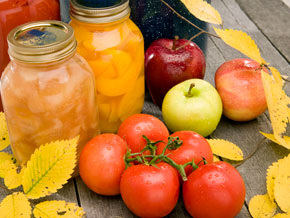Why Seasonal Fresh Fruit Fights Disease

Photo: © 2009 Jupiterimages Corporation
No matter the time of year, strive to make fruit a part of your healthy eating plan. Studies have shown fruit can help prevent stroke, certain cancers and diseases.
Go ahead—spend more money at the fruit stand than a wannabe rocker would spend on iTunes. When it comes to buying fruit, going overboard could save you from brain damage.If you start your day eating, say, a bowl of sweet strawberries, then add a wedge of cantaloupe at lunch and eat a juicy apricot or two later, each additional serving of fruit slashes your risk of a brain-crippling stroke by 11 percent. And all that fruit lowers your heart attack risk too.
The explanation? Signs point to potassium as a key part of fruit's power because it has the potential to keep blood pressure down. But it doesn't hurt that fruit's also full of fiber and other nutrients that help keep lousy LDL cholesterol, blood pressure and inflammation low and keep healthy HDL levels high. And those effects make your RealAge—and the RealAge of your arteries—much younger.
You get the most potassium from bananas, apricots, melons, oranges, nectarines, strawberries and figs. And in the vegetable world, sweet potatoes, spinach, tomatoes and avocados are rich sources too. Bonus: Their phytonutrients also decrease cancer risk.
Best choice: Head to your local farmers' market for the season's freshest. Typically, fruit travels more than 675 miles before hitting your table. That kind of trip takes a nutritional toll. Bananas, apricots and cherries, for instance, lose a significant amount of their antioxidants the longer they sit around.
Fortunately, there are exceptions: Apples, oranges, black grapes and tomatoes—remember, they are fruit—hold up well during storage, and dark plums actually get a tiny antioxidant boost if they cool their heels for a while. Sweet!
Plan Your Seasonal Menu






